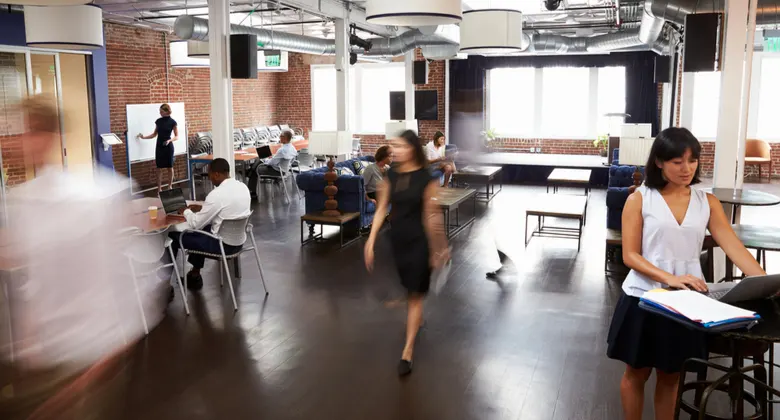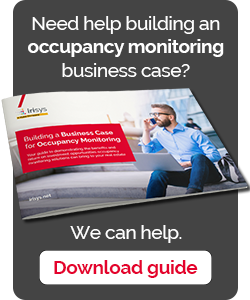Is there a difference between hot desk booking and desk hoteling?
Thanks to cosy, relaxed offices and shiny co-working spaces with free snacks, hot desking has been growing in popularity for a number of years. While at the moment, the closest many of us may be getting to hot desking is turning up the radiator in the living room, at some point in the (hopefully) near future, employees are going to be heading back to the office. But what will they be heading back to?
Newly flexible and hybrid working patterns mean that some employees - if not the majority, will only be coming back to the office for a few days a week. As a result, many businesses are rethinking how to get the most of their office space in a way that works for employees on all different types of contracts, as well as their business as a whole. Hot desking and desk hoteling are proving to be important pieces of this puzzle - but what’s the difference?
Hot desking vs. desk hoteling
What is desk hoteling?
Allowing businesses to manage the flexible work environment, desk hoteling gives employees the power to reserve desks, meeting areas and other spaces. While desks aren’t assigned to specific employees, people still have some choice and control over where they work, for example, if they know they need to collaborate with a certain colleague on one day, they can use the company’s desk hoteling software to book a desk in the same area. Technology is everything; to implement desk hoteling effectively you need to make use of data from desk monitoring sensors.
What is the difference between desk hoteling and hot desking?
Of course, hot desking and hoteling are similar in many ways. Ultimately both systems involve users choosing from a variety of workspaces based on their individual needs at a given time. Spaces have no dedicated “owners'' and are used as and when employees need them. However, there are some important factors that make each of these methods different.
In hot desking, the occupancy of the desks will operate on a shift-based or first-come-first-first-served basis. The admissions will change frequently and entirely ad hoc throughout the day. With desk hoteling, people reserve the spaces they want to use through a booking app or service in a more formalised way. These allocations are often longer in duration.
In terms of the actual benefit for employees, hoteling solves many of the challenges that have led to criticism of hot desking over the years. With no way to choose and control the sort of environment that they need for work on any given day, a quiet space, for example, when they need to work on a big report, employees can be left feeling frustrated and stressed - not how they need to feel in order to do their best work.
Now, in light of the current health crisis, there are other challenges involved with hot desking, most notably hygiene and cleanliness. With people coming and going from desks at different points during the working day, it can be difficult for cleaning and maintenance staff to identify exactly which spaces need to be cleaned and when. This ultimately presents a health and safety risk to staff members and should be avoided at all costs to help employees feel confident as they transition back to office life. Desk booking is hot desking’s better, more hygienic cousin.
How can desk monitoring sensors facilitate desk hoteling?
Great question. In modern desk hoteling, discreet desk monitoring sensors are typically placed on the underside of a desk and use an anonymous sensing technology such as PIR to detect when a person enters their field of view. These sensors detect motion within a narrow field of view, silently yet accurately detecting if a person is occupying the desk.
The data from these sensors can be integrated with your desk hoteling system, so that you can automate systems and send alerts or notifications when someone is present or not at a desk. As well as easing the overall flow of people around your workspace, integrating real-time occupancy data in to your desk hoteling system enables employees to formally reserve their workstation, much like booking a hotel room. This reduces general confusion, as well as the amount of time employees spend searching for a workstation on a daily basis.
By leveraging this data to automatically detect when desks are occupied or unoccupied, managers are able to identify where a desk is free, not free and automatically cancel bookings if no one shows up. This is a major advantage of desk sensors - preventing a desk being booked out for an entire day if the employee fails to show up to use it. By using the booking system in conjunction with sensors you can free up the space when no movement has been detected for, say 30mins after the start of the session.
What are the benefits of desk hoteling?
Desk hoteling:
Improves employee experience allowing staff to be efficient when finding somewhere to work, using reservations to find the right space for them. They can base their decision to come into the office on whether they can see if it's a busy or quiet day in regards to the number of reservations being shown. They can also easily locate other members of staff using an integrated wayfinding app.
Dramatically improves hygiene ensuring staff have a freshly-cleaned space to work in each and every time. With the pandemic still front-of-mind for businesses and employees alike, the return to the office will be fraught with concerns about employee safety. Your people will expect hygiene protocols to be to the highest standard. By integrating your sensors and desk hoteling software with a cleaning scheduling system, you can have complete confidence in the cleanliness of your space, managing the process of pre-booking, zoning and tracking desk occupancy to ensure total safety.
Helps you as a business utilise space better increasing your person-to-desk ratio and giving you valuable data about occupancy across locations and floors that can reveal potential inefficiencies and ways you can save on costs in the long term.
To find out more about how desk monitoring sensors can benefit your business, get in contact with us here.
Share this
You May Also Like
These Related Posts

What Can A Desk Occupancy Sensor Do For The New Workplace?

The Expert Opinion: Is The Open Space Office Becoming A Destination?

How True Occupancy Data can Turn Your Building Into a Smart Building
Connect with us
Need more information? Ready to get started? We're here to help, get in touch.


